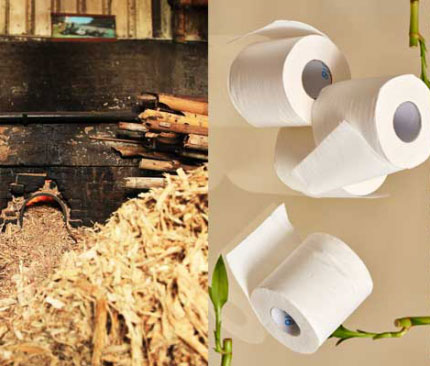bagasse pulp making
Bagasse is a by-product of sugar mills and a typical raw material for papermaking fibers. Sugarcane is a stalk-like plant fiber raw material that grows in one year. The average fiber length was 1.47-3.04 mm and the fiber length of bagasse was 1.0-2.34mm, which was similar to that of broad-leaved fiber. Bagasse after pulp removal was a good raw material for papermaking.
Bagasse is a kind of grass fiber. It is easy to cook and bleach. It consumes less chemicals and contains less silicon than wood, but it is lower than other grass fiber raw materials. Therefore, bagasse pulping and alkali recovery technology and equipment are more mature and simple than other straw fiber raw materials. So bagasse is a cheaper raw material for pulping. Bagasse bleached chemical pulp can be mixed with a certain amount of long fiber to produce various high-grade cultural and domestic paper, such as copy paper, double rubber paper, advanced toilet paper, napkin and so on.
After years of research and production practice, the technology and equipment of bagasse pulp and paper production have developed rapidly, and the investment of bagasse pulp and paper making is more economical and more mature than other non wood raw materials and broad-leaved wood pulp and paper making.

How to make paper pulp with bagasse?
Traditional bagasse papermaking technology and main equipment are: sugarcane is one of the main raw materials for sugar production. About 50% of the fiber left over from the sugar-pressed bagasse can be used to make paper. However, there are some sugarcane pulp (pulp cells) without interwoven force, should be removed before the pulping process. The length of bagasse fiber is about 0.65-2.17mm and the width is 21-28 μm. Although its fiber morphology is not as good as wood and bamboo, it is slightly superior to rice and wheat straw fiber. After the pulp can be mixed with some wood pulp, the printing paper, the cement bag paper, etc.
Material preparation: the first semi-dry pulp removal is carried out in the sugar mill and then packed to the paper mill for dry storage, and then the qualified paper material is obtained after the dry pulp removal by horizontal or vertical pulping machine.
Pulping: the process of pulping is as follows: cooking, washing, screening and bleaching. Bagasse is the most commonly used cooking equipment, because bagasse is easy to cook, so it is more suitable for small enterprises to use bagasse as cooking equipment, because it has the advantages of less investment, simple operation and high flexibility. Drum vacuum washer is the most commonly used equipment for washing pulp. Because of its low operating cost, simple operation and high extraction rate of black liquor, many manufacturers use this equipment as washing equipment. The screening system was an open low concentration screening system with a concentration of 0.8 ~ 1.0. Bagasse pulp is easy to bleach, ordinary CEH of the three-stage drift can be.
Now the cooking section adopts alkali continuous cooking and cold spray pulping. The cooking equipment adopts the horizontal tube type continuous cooker.

Conclusion
For bagasse, which had previously been burned as fuel, the use value of bagasse as paper feedstock would be increased by three to five times. As the raw material of paper making, bagasse per ton of bagasse can replace 0.5~0.8m3 in papermaking and make full use of bagasse, which can alleviate the shortage of wood raw materials and play an active role in environmental protection. Bagasse is a kind of paper-making resource with high quality and high regeneration power. Sugarcane is rich in resources and can be used permanently every year. Comprehensive utilization of bagasse papermaking is good for protecting resources and protecting ecology. In China, bagasse pulping and papermaking and black liquor alkali recovery have mature experience, development and utilization. Bagasse paper resources meet the basic requirements of sustainable development.

